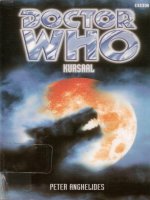Dr who BBC eighth doctor 35 the banquo legacy (v1 0) andy lane and justin richards
Bạn đang xem bản rút gọn của tài liệu. Xem và tải ngay bản đầy đủ của tài liệu tại đây (788.4 KB, 251 trang )
Banquo Manor – scene of a gruesome murder a hundred years ago. Now
history is about to repeat itself.
1898 – the age of advancement, of electricity, of technology. Scientist
Richard Harries is preparing to push the boundaries of science still further,
into a new area: the science of the mind.
Pieced together at last from the accounts of solicitor John Hopkinson and
Inspector Ian Stratford of Scotland Yard, the full story of Banquo Manor can
now be told.
Or can it? Even Hopkinson and Stratford don’t know the truth about the
mysterious Doctor Friedlander and his associate Herr Kreiner – noted
forensic scientists from Germany who have come to witness the experiment.
And for the Doctor, time is literally running out. He knows that Compassion
is dying. He’s aware that he has lost his own ability to regenerate. He’s
worried by Fitz’s fake German accent. And he’s desperate to uncover the
Time Lord agent who has him trapped.
This is another in the series of original adventures for the Eighth Doctor.
THE BANQUO LEGACY
ANDY LANE AND JUSTIN RICHARDS
Published by BBC Worldwide Ltd,
Woodlands, 80 Wood Lane
London W12 0TT
First published 2000
Copyright © Andy Lane & Justin Richards 2000
The moral right of the author has been asserted
Original series broadcast on the BBC
Format © BBC 1963
Dr Who and TARDIS are trademarks of the BBC
ISBN 0 563 53808 2
Imaging by Black Sheep, copyright © BBC 2000
Printed and bound in Great Britain by Mackays of Chatham
Cover printed by Belmont Press Ltd, Northampton
Dedications
Andy:
To Deborah Powell, in the unlikely event that you ever read this, for
persuading me to remove the line ‘my heart leaped within me like a salmon’
and thus rendering the book readable at least.
And to Justin Richards, Craig Hinton, Andrew Martin and Mike Nicholson –
friends then and friends now.
Justin:
For Alison, Julian and Christian, as and for ever.
And to friends then and now: Andy (of course), Andrew, Craig, Dave, David,
Gary, both Peters, other Andrew, and the rest of the DumbleCon crowd. And
Steve.
Contents
Front Matter
1
Beginnings: 1798
3
Arrival: 1898
9
Finale: 1968
13
Body
17
The Account of John Hopkinson (1)
19
The Report of Inspector Ian Stratford (1)
23
The Account of John Hopkinson (2)
27
The Report of Inspector Ian Stratford (2)
33
The Account of John Hopkinson (3)
39
The Report of Inspector Ian Stratford (3)
45
The Account of John Hopkinson (4)
47
The Report of Inspector Ian Stratford (4)
61
The Account of John Hopkinson (5)
67
The Report of Inspector Ian Stratford (5)
73
The Account of John Hopkinson (6)
87
The Report of Inspector Ian Stratford (6)
95
The Account of John Hopkinson (7)
99
The Report of Inspector Ian Stratford (7)
103
The Account of John Hopkinson (8)
107
The Report of Inspector Ian Stratford (8)
113
The Account of John Hopkinson (9)
117
The Report of Inspector Ian Stratford (9)
119
The Account of John Hopkinson (10)
123
The Report of Inspector Ian Stratford (10)
127
The Account of John Hopkinson (11)
129
The Report of Inspector Ian Stratford (11)
133
The Account of John Hopkinson (12)
137
The Report of Inspector Ian Stratford (12)
141
The Account of John Hopkinson (13)
145
The Report of Inspector Ian Stratford (13)
147
The Account of John Hopkinson (14)
149
The Report of Inspector Ian Stratford (14)
151
The Account of John Hopkinson (15)
153
The Report of Inspector Ian Stratford (15)
155
The Account of John Hopkinson (16)
157
The Report of Inspector Ian Stratford (16)
159
The Account of John Hopkinson (17)
161
The Report of Inspector Ian Stratford (17)
163
The Account of John Hopkinson (18)
165
The Report of Inspector Ian Stratford (18)
167
The Account of John Hopkinson (19)
169
The Report of Inspector Ian Stratford (19)
173
The Account of John Hopkinson (20)
183
The Report of Inspector Ian Stratford (20)
185
The Account of John Hopkinson (21)
195
The Report of Inspector Ian Stratford (21)
205
The Account of John Hopkinson (22)
209
The Report of Inspector Ian Stratford (22)
215
The Account of John Hopkinson (23)
219
The Report of Inspector Ian Stratford (23)
225
The Account of John Hopkinson (24)
231
The Report of Inspector Ian Stratford (24)
235
Closure
237
Finale: 1968
239
About the Authors
241
Front Matter
Beginnings: 1798
Even the kitchen windows had bars, despite being set so high up the solid
walls. Quite ridiculous, mused Thomas Jeffries out of habit rather than insight
as he lifted the tray of plates and set off on his last journey down the long cold
corridor. Only one more tray, then he could get home.
Home. Warm and dry, his own supper waiting and Jane sitting by the fire
nursing William. Only the echo of his nailed boots on the hard floor prevented
Thomas from slipping completely into reverie. Not long now, if he could only
survive the storm outside.
Perhaps, he thought, Pamela would want to talk. She often did. He enjoyed
listening to her, despite her childlike nature. She would tell him how beautiful
the storm was and how she was not in the least frightened by it. And he would
tell her about what was happening in the village, all the local gossip. How her
cousin was up at the Manor, and what they were saying this week about her
dead grandmother. Pamela would tell him how silly they all were and how
they ought to be looked after properly. And Thomas would laugh and leave
her to eat her bread, hoping the storm would soon abate.
A piercing scream rebounded along the corridor. Thomas absently kicked
at the door it came from as he passed. He was wondering again why William
was such a sickly child. Best not to worry, Doctor Merrick had said.
Pamela too had been a sickly child when Thomas had first seen her four
years ago – was it really that long? Now she was fit and healthy. A healthy
body if not a healthy mind.
‘Why is she here?’ he had asked. And they had told him. He still found
it hard to believe. She was a good girl. Slow and childlike even now, her
attitude lagging behind her nineteen years. But she meant well. Everything
she said and did she believed in her heart was for the best. So few worries. For
Thomas, even the small cut on the neck from shaving remained an annoyance
as it rubbed against his starched collar.
He balanced the tray on one hand as he pushed the key into the lock with
the other. A metallic scrape, a staccato click, and the heavy door swung slowly
open.
She noticed at once. ‘What have you done?’ Pamela’s eyes were wide with
worry.
3
‘It’s only a scratch. From my razor.’ He put down the tray, fingers grazing at
the thin red line.
‘But, doesn’t it hurt, Thomas?’
He laughed at her concern. ‘It’s just a little blood. That’s all.’
She looked at him for a moment, thoughtful. ‘I must kiss it well again for
you,’ she said at last.
He laughed at her serious manner. ‘All right.’ He wished he had a daughter
like her, to help nurse his sick son.
She stepped closer, her eyes fixed on the scratch at his neck. He smiled as
she reached up and put her arms round his head. Her lips closed warmly on
the thin red scratch as she closed her eyes.
He felt strangely tense, despite her closeness and the moisture of her mouth
sucking slightly at his neck. Thomas closed his arms around her, protecting
her, and felt the heat from her body as he embraced it.
‘She killed a cat.’
He heard the voice drifting out of the dead years, and then his own voice
answering. ‘That hardly seems enough.’
An invisible chuckle. And then: ‘She drank its blood,’ came the cold reply as
she buried her teeth in his soft throat.
For a second his frame went rigid. Then he relaxed, his weight falling on her
receiving body as his warmth and life throbbed into her. She held him upright,
pressed hard against her hot breast, her mouth wide open.
After a while she opened her eyes, relaxed. She listened to the moon-red
rain spattering against the flagstones outside and the blood dripping to the
floor. She felt warm and vital. Ready to go out. Ready to play.
Robert Dodds – the Robert Dodds – tied his dressing gown cord with a flourish.
Hands lightly but firmly in the pockets, he looked around the chamber.
‘Get thee to bed,’ he said hugely to a chair by the window, then turned
smartly towards the door. He removed a cigar from the box on the dressing
table and held it cradled in his hands in front of him. He glared at it furiously, eyebrows knitted in concentration as from the base of his stomach he
declaimed: ‘Is this –’
He broke off, concentration suddenly snapped, and glanced around. Nothing seemed amiss. So why was he suddenly so nervous? He felt a chill, as if a
door had been opened and the storm outside was working its way in towards
him. He knew that some actors were deeply superstitious, especially when
dealing with ‘the Scottish Play’. But Dodds was not one of them – Macbeth
held no fears for him.
4
‘Is this’, he repeated, ‘a dagger which I see before me, The handle toward
my –’ He broke off again. He was sure it was the handle, but what was it ‘toward’? With theatrical disdain Dodds raised the cigar to his mouth. Banquo
was a far better part, anyway. One that only a true genius (such as, for example, himself) could fully bring to life. A fitting memorial for his late, beloved
aunt. His late, beloved, rich aunt.
Dodds looked around his bed chamber again, satisfying himself that the
legacy was intact. Property – a sound investment. But already the house made
strange noises. He could swear that earlier he had heard someone moving
downstairs. But he knew the house to be empty.
Smiling at his own foolish fancies, Dodds placed the cigar precisely on his
desk, between blotter and hourglass, and prepared (right hand over heart) to
deliver his finale. Banquo Manor would once again re-echo to the words of
Shakespeare, the words of his master creation: Banquo himself.
He cleared his throat into a silk-red handkerchief. Then, pushing the kerchief back into a pocket, he raised a hand and bellowed, ‘Hold, take my sword.’
A creak from the landing. The house seemed to appreciate the immaculate
performance.
‘There’s husbandry in Heaven. . . ’
The gas lamp looked on, with cold indifference as the candles on the bed sputtered nervously. . .
‘Their candles are all out.’
. . . and went out, as if caught in a draught.
‘Take thee that too.’ Dodds held out his imaginary dagger. He was defenceless now. ‘A heavy summons lies like lead upon me, and yet I would not sleep.’
The creaking seemed closer now – as if approaching down the ill-lit corridor
outside. And from further away there was another creaking – a rhythmic, mechanical grating.
‘Merciful powers.’ His voice had gained all the frightened nuances of reality,
as if the creaking of the floorboards was gesturing to him, hastening him to
the end of his performance. He tried to regain a grip on his shaking emotions.
‘Restrain in me the cursed thoughts. . . ’
Was that shadow in the doorway somehow deeper now than it had been?
‘. . . that nature gives way to in repose.’
No, surely it was his imagination. An unreal shadow, as in a bad dream. Yet
still it seemed to be gaining form and substance.
‘Give me my sword.’ Dodds was sure now: there was someone outside in
the corridor. His hand closed on nothing, and he realised at last that there
was no sword. ‘Who’s there?’ he stammered.
‘A friend.’ The voice was light and honeyed, a young woman. It seemed to
cloy.
5
Dodds felt suddenly sick. And the formless shadow in the doorway stepped
forward into the light.
He had seen only her a few times, and then to ease his aunt’s – her grandmother’s – conscience rather than his own. But he recognised her at once.
Instinctively.
At first he thought that she had fallen down in the grounds, that she was
wet from the rain and mud. But as she stepped further into the diffuse light
he realised his mistake, and backed away.
Her long hair was soaked, plastered to her head and then falling in thick
bunches across her shoulders. Several stray strands had blown forward and
down over the material that clung wetly to her bosom. Against the dirty
white of the shift he could see that she was drenched red. Her bare feet were
muddy, and about her ankles were splashes of dried blood. Some were from
the cuts and scratches on her feet and legs from the long walk. But not all.
The shift itself was still near white at the top, but lower down, while just
as wet, clinging to her body as if she had bathed in it, the material became
progressively darker.
His first thought was that she had met with an accident, but then he saw
the red light in her eyes and the dried blood that caked her mouth and chin,
which had dripped and streaked down her body. And he saw a dagger before
him, its point towards his heart.
In the same moment he felt his back meet the wall and begin to prickle as
the perspiration sought out a space to run down from his pores.
There was a flash like lightning behind his eyes as the knife -from his own
kitchen, though he scarcely had time to remark it – was driven up past his
ribs and into his heart. He felt his sweat freeze and saw his blood splash over
her. His arm lashed out unbidden across the table, catching the hourglass,
knocking it on its side and shattering the lower bowl.
‘Our time –’ he gasped. But he could not finish the line. Already he could
feel the blood as it rose in his throat and she pushed the knife back into his
chest. He felt a sudden final impulse to catch the grains of sand as they trickled
over the edge of the table to the floor. But they fell dryly through his fingers
and he felt the floor smash into his falling shoulder.
For a split second he saw her standing beautiful over him, the knife dripping
like her gory locks as she raised it again. Then the image glazed and the
crimson of her mouth and hair blurred until everything was scarlet and silent.
She let the knife slip to the floor and knelt down over him, pulling the stained
dressing gown away from his ripped torso. She held her face close against his
chest and let the blood bubble and gush into her mouth and nose and eyes.
6
Laughing into it. She felt clean at last, rubbing handfuls of the liquid over her
hair and face, into her cold stomach and wet breasts, bathing in his death.
The still, gaunt figure in the doorway watched impassively. ‘It seems I’m just
in time,’ it murmured.
7
Arrival: 1898
‘What the hell’s going on?’ Fitz shouted above the maelstrom of noise. It was
the third time he had shouted the same question. It was the third time he got
no answer.
The light was a blood-red strobe that scythed back and forth through the
blackness of the console room. Compassion’s cries were quieter now, but the
anguish, the hurt, was every bit as intense. They mixed in with the roar and
scrape of materialisation.
The Doctor was clinging to the console with one hand; the fingers of his
other hand rattled over the controls and he peered at readouts, snatching
information from the flashes of illumination as the light passed.
Fitz was sprawled across a chair, afraid to move in case he was tipped out
and flung around the bucking floor. ‘Will someone please –’ he shouted again.
‘Power drain.’ The Doctor did not seem to be shouting, but nonetheless his
voice was clearly audible as he cut across Fitz. ‘Ninety per cent loss of Artron
energy.’
‘Artron what?’ Fitz gave him five seconds before adding. ‘Sorry, I expect
you’re busy with. . . stuff.’
‘See if I can stabilise the systems. Hang on, Compassion!’ The Doctor’s
hands were a blur of stop-motion in the flashing light, seeming simultaneously
to be poised in three different positions.
‘What about emergency backup power things?’
‘They use Artron energy too.’
‘Can I help?’ Fitz asked, making no effort to move. His stomach lurched
with the floor. ‘Or shall I just keep quiet for a bit then?’
‘That would actually be a help.’
He said nothing. Was it his imagination or was the noise diminishing now?
He strained to hear the sound of Compassion’s engines, her materialisation
noise, above her shrieks of pain. It was not pleasant, and he ached for her
more than he would have thought. She was sarcastic and caustic, indifferent and aloof, emotionless and unfeeling. But for all that there was a bond
between them. He liked to think that somewhere, under that cool heartless
exterior was. . . well, something at least. Listening to anyone crying in pain
was difficult. But when it was a friend, someone you -
9
The crying stopped. The floor straightened itself out. The light settled into
a dull blood-red glow rather than a hysterical searchlight.
‘Well done, Doctor.’ Fitz leaped out of his chair and joined the Doctor at the
console.
‘I did nothing,’ the Doctor confessed.
Fitz shrugged. ‘Well done anyway. Whatever.’
‘How are you?’ the Doctor asked. There was concern on his face, his eyes
were glistening.
Fitz was touched. ‘Oh, I’m fine, actually.’
‘Not you,’ the Doctor told him.
‘Dying.’ Compassion’s answer was from all around them. But it was weak,
difficult, broken: ‘I – am – dying, Doctor.’ A pause, the sound of a faint sigh.
Then: ‘What is happening to me?’
The Doctor was shaking his head. ‘I don’t know. An almost total loss of
Artron energy.’ His face was grey, lined, as he looked at Fitz. ‘I feel it myself.’
‘It’s what you run on?’ Fitz asked in surprise.
‘In a manner of speaking. It’s a. . . well, a source of energy.’
‘Like sugar?’
‘Like oxygen.’
Fitz stared. Gaped. ‘You’re dying?’ His voice was a whisper.
The Doctor shook his head. ‘Oh no. Well, not yet. But I couldn’t regenerate,
which is something of a worry.’
‘Tell me about it,’ Fitz muttered. ‘And Compassion?’ he asked more loudly.
The Doctor was edging round the console, checking controls and stabbing
ineffectively at buttons. ‘It’s everything to her. There’s some sort of inhibitor
in operation nearby. Locked on to us as we started to materialise.’
‘The – Time – Lords,’ Compassion’s voice gasped.
‘Is it?’
The Doctor tapped his chin. ‘Could be. Could be,’ he conceded. ‘I don’t
know how they could have found us, could have predicted we would be here,
wherever here is. But it’s a deliberate attack, I’m sure.’
‘Help me, Doctor.’ Above them, Compassion’s face washed hazily into view
on the scanner, distorted by the weakness of the image. And by pain. ‘There
is a transtemporal emission. I’m blocking it.’ Every word was an effort now.
‘What’s that in human-speak?’
‘The Time Lords,’ the Doctor said. His fist slammed down on the console.
‘Or some agent of theirs. Sending a message to Gallifrey, telling them where
and when we are.’
‘But if Compassion is blocking it. . . ’
‘For the moment. She’s getting weaker by the second.’
10
‘Stabilised now.’ Her voice was still drained. ‘But won’t last. Blocking the
signal for as long as I can.’
‘While we find the inhibitor,’ the Doctor said. His frown deepened suddenly.
‘How did you manage that?’ His hands flew over the controls and a stream of
text and symbols spewed across Compassion’s face above them. ‘I see. Very
clever.’ There was pride as well as admiration in his voice, as if he reckoned
he deserved some of the credit.
Well, Fitz thought, he probably did. Whatever it was for. ‘And for the hard
of deciphering?’ he prompted.
‘We were plucked out of the vortex and materialised in midair. Thrown
across the sky like a comet.’ Sudden levity now as the Doctor considered.
‘Probably very spectacular.’
‘Yes, I felt that bit,’ Fitz agreed.
‘But Compassion has managed to latch on to a local host for her outer plasmic shell. Something approximating her natural appearance that can provide
a surrogate shell until we disable the inhibitor. Gives her stability and us time.’
‘Neat,’ Fitz said. ‘I assume.’
The Doctor was nodding in appreciation. ‘Oh yes, very neat. Now we need
to get out of here before we’re trapped inside. As she loses more power,
Compassion will lose her ability to create a portal through the shell.’
Fitz thought about this as the Doctor buttoned his coat. ‘So,’ he said slowly,
‘given the choice, we’re going to get ourselves trapped outside instead of inside. Right?’
‘Right,’ the Doctor agreed. ‘In the snow.’
‘In the snow.’ Fitz considered this. ‘With a Time Lord agent.’
‘Very probably.’
‘Who has immense powers and is waiting for us out there in the cold.’
The Doctor sucked in his cheeks, then blew out a long breath. ‘I don’t think
he’ll be that powerful,’ he said at last. ‘After all, his own Artron energy will be
inhibited too. It’s an all-or-nothing deal.’ He frowned. ‘I imagine.’
Fitz rubbed his eyes. It didn’t really help. ‘And we are, where? When?’
‘Earth,’ Compassion said. But her voice was not her own. It was softer,
gentler somehow. ‘England. Late nineteenth century.’
The Doctor rubbed his hands together in a gleeful gesture that was belied
by his sombre expression. ‘Quite my favourite time and place,’ he said. ‘Given
the choice, if I had to be trapped in one time and place –’
‘Then I’d choose about a hundred years from now,’ Fitz interrupted. ‘What’,
he continued, ‘has happened to Compassion’s voice?’
‘Come on, don’t dawdle, we haven’t much time,’ the Doctor said. ‘And in
answer to your question,’ he continued as the doors swung slowly, almost
11
painfully open, ‘I imagine it’s already taking on the properties of the new
outer shell. Of the host.’
As he followed the Doctor through the doors, the implications began to
dawn on Fitz.
The Doctor’s voice was faint, muffled, distant as it floated back to him.
‘Unless I’m much mistaken, personality erosion will follow as Compassion’s
energy drains away. We can’t let her slip away too far or even her primary
focus of blocking the transmission will fail. And after that her systems will shut
down completely as she drains the energies of the host entity as well. They’re
an organic gestalt. Inevitably there will be some confusion of identities. And
if one of them dies. . . ’
But Fitz was still working it out as he tumbled headlong out of Compassion.
He was cold, he was wet, he was struggling to his feet in a moonlit sea of
snow. ‘You’re telling me,’ he spluttered, ‘that this host, which is the closest
match Compassion could find to what you call “her natural appearance", is –’
He stopped short as he caught sight of the figure standing there, watching
them.
‘Obviously,’ the figure that was and was not Compassion said.
Fitz jumped as a hand tapped him on the shoulder. He swung round quickly.
Behind him the Doctor was smiling. ‘So far so good.’
‘The house is this way,’ she said. ‘Did you get lost?’
Fitz and the Doctor both turned slowly to stare at her.
‘You must be exhausted after your long journey. Let me show you the way.’
‘Confusion of identities?’ Fitz asked. He was having trouble tearing his eyes
away from her. ‘Stunning gestalt, by the way,’ he said, to the woman’s evident
confusion.
‘You know,’ the Doctor replied quietly, ‘I think it’s going to be one of those
days.’
12
Finale: 1968
It was a room for the dying. Everyone knew that, including the frail figure lying in the bed. What light there was struggled through the faded thin curtains
and was absorbed by dusty surfaces. The sounds of the home were muffled
by the door and the plasterboard-thin walls. Outside a Ford Corsair stuttered
into uneasy, throaty life. A dog barked.
The door opened, old and cracked. Its creak mingled with the high-pitched
nasal sigh of the breathing from the bed. A rectangle of yellow light was
broken by the figure that shuffled into the room. A broken, angled silhouette.
The figure in the bed twisted slightly to see, waved a weak and wrinkled hand.
‘Is it time for tea already?’ The old woman’s voice was as reedy and hesitant
as her breathing and her hand. ‘I don’t know where the time goes.’ She gave
up the struggle to lift her head and let it sink back into the crushed hollow of
the pillow. ‘Time.’ She rattled a coughing laugh. ‘I can hardly see any more,
but I know what Time looks like. And I do know where it goes.’
‘Time,’ the dark figure repeated as it reached the bed. The door clicked shut
behind it; the light faded back to a dusty gloom that shadowed the figure’s
face. ‘It has taken me a long time to find you.’
The woman twisted, trying to crane her neck sideways so as to see who was
standing beside the bed. ‘Do I know you?’ she murmured.
‘We have met. A long time ago.’
‘I’m sorry, I can’t quite place your voice. I have met so many people, you
see. And my eyes are not what they were.’
The dry rasping sound might have been a laugh. ‘It took me over fifty years
to recover,’ the croaky voice said. ‘Another twenty or more to find you.’
‘So many people,’ she repeated as if she had not heard. ‘I have known so
very many in my –’
‘Time?’ Again, the rasping laugh.
She struggled again to sit up, working her elbows into the mattress and
shifting her weight. ‘Are you sure we have met?’
‘Very sure.’
She gave up and sank back again. ‘They will bring the tea soon.’
‘I don’t think so.’
‘Oh they always do, you know.’
‘I know. But not today.’
13
‘Oh.’ She accepted that. No comment. No curiosity. If she screwed up her
eyes, tried to focus, she could just make out the pinprick glint of another pair
of eyes looking at her. It was blurred, it looked as if there were two sets of
eyes. Shimmering, moving, scratching.
Scratching? She could hear scratching. His nails perhaps. A nervous gesture. She had known someone once who. . . But that was almost a lifetime
ago.
‘Did you come to talk?’ she asked. ‘About old times?’
‘I came to read. About old times.’
‘Then you are blessed with eyes that are better than mine.’
‘Or cursed.’ Her whining breaths mixed with his stertorous rasps. ‘Where
do you keep them? The manuscripts.’
‘I don’t know what you mean,’ she lied, even as she felt her blood run cold.
‘Where are they?’
‘What manuscripts?’
‘The account written by your late husband.’
‘Ah.’
‘And the one written by your former lover.’
She breathed heavily for a few moments, summoning up the breath to answer. ‘You know of them?’
Another pause, as if he was considering his reply. Then: ‘Obviously.’
That caught her. She felt it. And she knew that it was indeed time. . . ‘They
are in the middle drawer of the cabinet. I like to keep them close.’ Her
wrinkled hand described an arc towards the cabinet by the bed. Towards the
drawer he had already opened.
He swept the tumbler and the small vase of dying flowers from the top
with a gesture, and put the two sets of papers in their place. One was held
together with rusted paperclips. They had left brown marks etched into the
mottled paper. The other was bound with a faded, brittle ribbon. He snapped
it, then reached into his jacket pocket.
‘You know, I only read them the once,’ she said. The scratching sound was
louder now. A staccato tapping, at once rhythmic yet random. She peered
through the gloom to see what he had placed beside the papers. There was
something by each pile. He was turning the leaves of both manuscripts at
once. She could see the blurred motion of the pages. And beside each, glinting, scratching shuffling was. . . She stretched slightly closer as she spoke.
‘They brought back such memories.’
‘I can listen as well as read,’ he said softly. ‘Tell me your memories. Everything. Somewhere in here, or here. Or in your mind.’
‘Is what?’
‘The answer. The information I need.’
14
‘I remember. . . ’ she began. But then a breeze lifted the curtain slightly,
allowed a little light to spill into the room.
And she caught sight of his face. His eyes. She gasped and sank back into
the bed. ‘How – how can you read?’
‘I can’t,’ he told her. ‘But I have friends who can.’
And in the same flutter of the curtain of time she remembered. And she saw
what he had placed beside the papers on the cabinet. And the horror and the
terror merely sharpened her memories.
15









